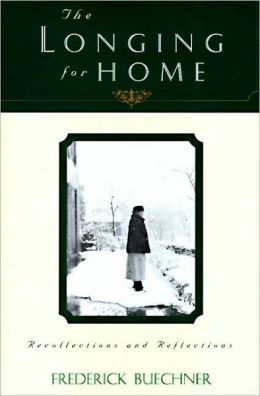The Book
The Longing For HomeFrederick Buechner
- On Google+ as: +Frederick Buechner
After getting ripped off by Barnes and Noble (I didn't realize it at the time, but some lawyer informed me that I was, in fact, ripped off) I was included in a settlement. As a result, I had a few pennies to rub together in my Barnes and Noble account. A good friend of mine, +Jonathan Roberts, had recommended that I read some Frederick Buechner. He said that he really enjoyed Buechner's work and that I would probably enjoy it too. I went ahead and purchased a couple of his nook-books and just finished reading The Longing for Home. I am glad that I did.
Technical Merit
Frederick Buechner is a wonderful writer. He is an author of both fiction and non-fiction, prose and poetry. As such, he is creative in both his thinking and expression. I remember one of my librarian friends said that she did not like poetry, but she loves when poets use their talents to write prose. I felt this way about Buechner's writing.As a result, sometimes Buechner's arguments are difficult to follow. I give The Longing for Home 4 out of 5 stars for technical merit for clarity of argument. I am certain that second and third readings will provide the clarity I desire, and this may prove to be a positive thing as I will likely read this title again.
The Review
In the long run, each of our stories turns out to be the story of us all, and the home we long for has in all likelihood been home to others whose names we don't even know and will be home again to still others when the ever-rolling stream of things has long since borne us away. (pg. 76)The Longing For Home is divided into two parts: The Home We Knew and The Home We Dream. In The Home We Knew, Buechner looks back on the places that he considered "home" and shares several episodes of what that means. He looks at places, people and relationships that make up the critical elements of what "home" is and continues to be despite how physical circumstances have changed.
This chapter is full of sentimental scenes, painting the picture of what is meant by the old adage which asks what converts a house into a home. An especially tender and heart-moving chapter contains the letter that he wrote his grandson, which was to be read at the grandson's twenty-first birthday. Yet, in the midst of all this sentimentality, Buechner states the following:
We are in constant danger of being not actors in the drama of our own lives but reactors. (pg. 80)So even though it is good to look back and remember. Even though it is good to be cognizant of the love that surrounds us. We must also be ready to actively live out this life and not dwell on the past and depend on it to carry us forward.
The second section, The Home We Dream, looks to scripture and loosely applies the methodology of the first section to the heavenly realm. Buechner plays on the idea that our citizenship is not on this earth, but elsewhere. One of his favorite scenes is the breakfast the Jesus makes his disciples after his bodily resurrection. It is a reassuring meal, prepared by a loved one, in a familiar place. If this is not home, I do not know what is.
To be homeless the way people like you and me are apt to be homeless is to have homes all over the place but not to be really at home in any of them. To be really at home is to be really at peace, and our lives are so intricately interwoven that there can be no real peace for any of us until there is real peace for all of us. (pg. 102)Finding peace of mind, to Buechner, is the ultimate sense of being at home. Restlessness is true homelessness. For the Christian, Jesus Christ is their prince of peace and, due to the connected nature of the human race, we will not be at peace until everyone accepts our prince of peace. In this way, finding home while living in this world is necessarily to evangelize and spread the gospel. While it is a command, it is also a natural longing.



